This is a guest post by Jessica Freeman-Slade.
When I think of the inspiring women in the books I read as a kid, I don’t think of the girls my age like Ramona Quimby or Harriet Welsh. No, when I was 10 years old, I wanted, more than anything, to be Josephine “Jo” March, the central character in Louisa May Alcott’s extraordinary 1868 novel, Little Women. While some little girls would bristle at the hoop skirts and Civil War hardship and use of such offensive curses as “Christopher Columbus!” I adored it…in part because I saw the March girls as out of their time, rambunctious, admirable, and most clearly modern. There have been many film adaptations of Alcott’s story, but in Gillian Armstrong’s 1994 version, you feel the modernity first and foremost, as the brilliant screenplay and even more brilliant performances of Winona Ryder, Susan Sarandon, and the other girls show you what you’ve always suspected: that Little Women is a full-on feminist narrative.
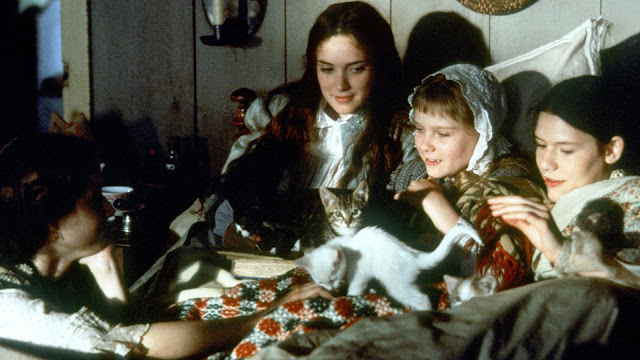 |
| March girls in bed |
True, sometimes Little Women looks like “chick lit”—and certainly if it were published today, its cover would telegraph it as such, in curlicue text, pink background, and lacy border. But it was a truly subversive thing to have a female-centric novel in the late 1800s: a book in which the first half is without a wedding, where women talk to each other without needing a man to talk about, and where women rail against the limitations set upon them. Little Women was an extraordinary achievement and a commercial success, and it made Louisa May Alcott a literary icon equal to Jane Austen (who wrote about the rocky road to successful marriages) and the Bronte sisters (who wrote about the tragic consequences of failed romance). If you really want to hate on the “chick lit” classification of Little Women, just remember: before you could be a Hannah/Marnie/Jessa/Shoshanna, or even a Carrie/Miranda/Samantha/Charlotte, you had the much richer pantheon of Jo, Amy, Meg, and Beth to choose from.
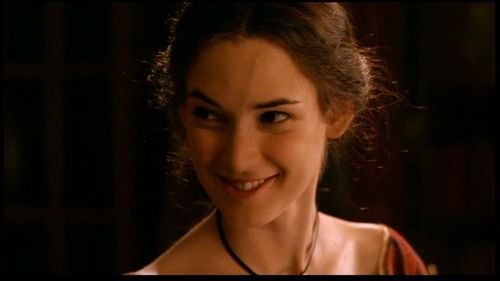 |
| Winona Ryder as Jo |
These young women talk openly about money, politics, education, love, and above all, the expectations set upon them. Jo (Ryder) drives the movie, narrates and controls its pace, and she gives the perfect period performance by a contemporary actress—in part because she doesn’t hide just how modern and unnatural she is in the heavy skirts she’s obligated to wear. She seems genuinely uncomfortable, just as Jo would be, slouching, hunching, galumphing about, talking with her mouth full, stomping her feet in the snow. Jo has bigger ambitions than to be pretty or charming: she has a bright mind, a passion for writing, and a dream of sharing her stories with the world. Ryder’s passion, the gusto with which she delivers every line, sings out, and makes this one of her best performances.
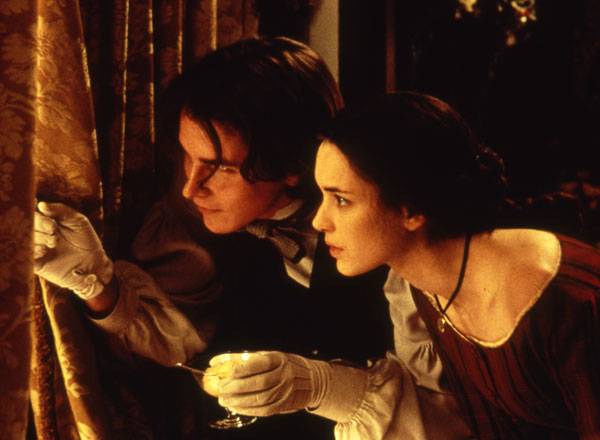 |
| Laurie (Christian Bale) and Jo |
Jo’s impulse, in every situation, is to express her true opinions, which makes it difficult for her to imagine conventional love with any kind of traditional man. Her friendship with Theodore “Laurie” Laurence (a smoking hot Christian Bale), the rich boy next door, is grounded in an appreciation of each other’s good humor, intelligence, and kindness. When Laurie and Jo first meet, sparks fly not from physical attraction, but a heady, hilarious exchange of wits. Their relationship is rooted in mutual respect, and a mutual desire to cast off societal expectations for proper behavior. (No coincidence that they both go by nicknames.) Neither of them fit a mold, and so they fit perfectly together. “If only I were the swooning type,” jokes Jo after a night at the theater. “If only I were the catching type,” Laurie retorts playfully. When Jo insists the girls include Laurie in their theatrical enterprises, he’s only allowed to do so by volunteering a means of communication—a mailbox stationed between their two houses, to encourage “the baring of our souls, and the telling of our most appalling secrets.” Because the girls hold the power, they are the ones who decide whether Laurie can be trusted. They are the rulers of their own government, and so, Jo narrates, “And so Laurie was admitted as an equal into our society, and we March girls could enjoy the daily novelty of having a brother of our very own.”
But Laurie, however sibling-like, never gets a relationship as intense as that between the sisters: the girls are fiercely loyal to each other and collaborative in bringing life, culture, and comforts to their home. They write plays and newspapers, sing songs, and rally in times of great poverty and conflict. The first half of the film, focused on their childhood years during the War, brings each girl’s dreams and frustrations into focus, and establishes the characteristics that will follow them into adulthood.
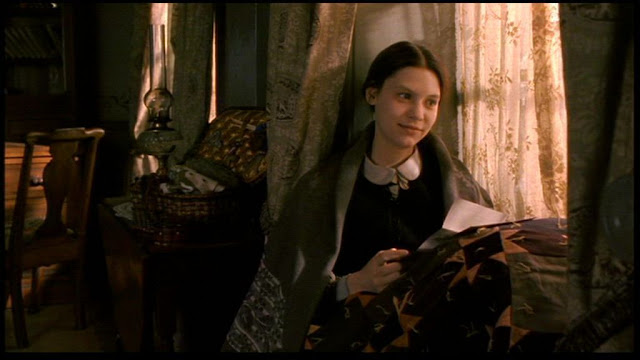 |
| Claire Danes as Beth |
A 14-year-old Claire Danes, perfectly suited to her role as a less moody Angela Chase dressed up in gingham, plays Beth. During a recent viewing, I found myself muttering, “Ugh, Beth sucks,” a reaction provoked by her demure, stick-in-the-mud, Mary Bennett-like status. But Beth is daunted by the prospect of having to grow up—and so, she never truly does, remaining housebound by a childhood illness. “I never saw myself as anything much,” Beth says, soft-spoken and sweet even on her deathbed. “Why does everyone want to go away? I love being home.” (Beth’s death scene, a tearjerker by any standard, is especially poignant when you realize that, though Beth’s adventures had a smaller sphere, they were no less wonderful to her.)
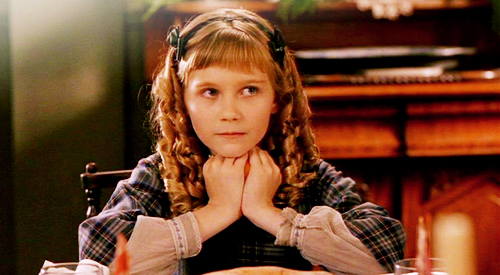 |
| Kirsten Dunst as Amy |
The youngest March sister, Amy (played, in the first half, by a wonderfully petulant 12-year-old Kirsten Dunst) is constantly looking ahead, making proud declarations about how she plans to reshape her nose and marry someone “disgustingly rich.” “We’ll all grow up someday,” Amy says, “We might as well know what we want.” Amy’s vanity and flightiness are often, but Dunst brings a tender longing to her growing pains, giving real weight to the scene where she reveals that her schoolteacher beat her for trading limes at recess. When Amy tells her family “Mr. Davis said it was as useful to educate a woman as to educate a female cat,” they unite against him. Amy may be frivolous at times, but she has the same sense of outrage as her sisters.
But these girls are not always lovely in dealing with their problems: they get to have real conflicts, fully violent confrontations, and true arguments. No moment is more frightening than that of Amy’s revenge on Jo after a night out, an attack so specifically crafted that it could only result in a dramatic fight. “Your young ladies are unusually active,” says Mr. Brooke to Marmee (Sarandon), and she smiles coyly in response. These girls are unconventionally free, far from the “gentling influence” that others expect them to be—for better or for worse.
What drives the film, and what shows its strengths as a female-directed, written-, and produced endeavor, is addressing the complexities of female life even as the film pivots into the March girls’ adult lives. The oldest March sister, Meg (Trini Alvarado) chooses love over fortune when she marries Laurie’s former tutor, John Brooke (Eric Stoltz). Amy (now played by Samantha Mathis, far less feisty in adulthood) travels with Aunt March (Mary Wickes) to France, where she develops her talents as an artist and reassesses her ideas of romantic love. And Jo, when confronted with an unexpected proposal from Laurie, surprises even herself when she declines his offer—not because she doesn’t love him, but because she cannot envision herself as a wife.
Laurie’s proposal is full of admiration for Jo’s specific virtues (“I swear I’ll be a saint,” he pleads. “I’ll let you win every argument”), but Jo cannot see her dearest friend as any kind of conventional beau. Frustrated with herself, with her inability to change and become a traditional woman, Jo breaks down in tears, but soon charges forward on a challenge from Marmee: “Go and embrace your liberty, and see what wonderful things come of it.” The movie shifts to focus squarely on Jo on her own in New York, pursuing any chance to set her writing free, and to find someone who will love her as she is.
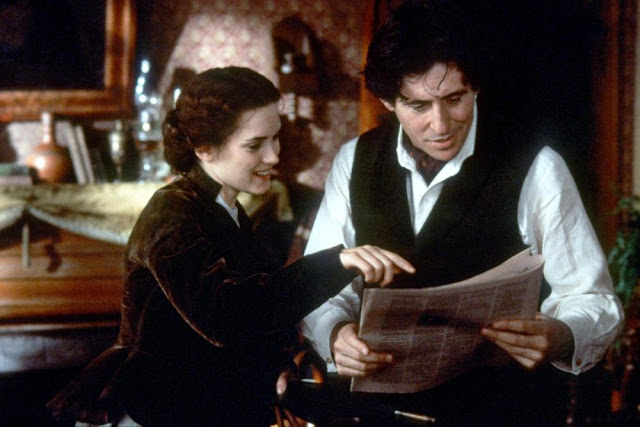 |
| Jo and Bhaer (Gabriel Byrne) |
While shopping her writing to disdainful publishers, she meets Friedrich Bhaer (Gabriel Byrne), a professor who bonds with her first by intellect (they exchange lines of Goethe and Walt Whitman) and then by love. Bhaer encourages her to speak her mind, to take and defend her political stances, and to be bold in her writing and in her life. Jo is pushed to go far beyond her fantastical thrillers and to uncover something she truly wants to talk about, to deepen and shape her childhood fancies into real art. Jo finds herself able to love only when she can be loved for herself as she is. “Jo…” Bhaer says, tenderly embracing her at the film’s close. “Such a little name for such a person.”
 |
| Meg played by Trini Alvarado |
You can see Jo’s journey as the heart of Little Women, and that’s fine. But my admiration for Armstrong’s film truly crystallized when you look at how the movie treats Meg March. Though she possesses great compassion and intelligence, Meg is constantly appraised as a beautiful, eligible young woman ready for a proper beau. Her conflicts with Jo primarily arise over how much she should follow other girls’ examples in proper behavior at parties and balls, and the constant refrain from her Aunt March is that the “one hope for [the] family is for [Meg] to marry well.” However, Meg constantly questions how she’ll negotiate the world when she will always be seen as a pretty girl, whether she must play the part at every turn or strike out on her own. But there is a reason that you have Marmee played by the actress formerly known as Louise Sawyer: in her response to Meg’s questions, Marmee’s message about a woman’s place becomes not just bold, but revolutionary.
Marmee: Nothing provokes speculation more than the sight of a woman enjoying herself.
Meg: Why is it Laurie may do as he likes, and flirt and tipple champagne…
Marmee: … And no one thinks the less of him? Well, I suppose, for one practical reason: Laurie is a man. And as such, he may vote and hold property and pursue any profession he pleases. And so he is not so easily demeaned.
Meg: […] it’s nice to be praised and admired; I couldn’t help but like it.
Marmee: Of course not. I only care what you think of yourself. If you feel your value lies in being merely decorative, I fear that someday you might find yourself believing that that’s all you really are. Time erodes all such beauty—but what it cannot diminish is the wonderful workings of your mind. Your humor, your kindness, and your moral courage—these are the things I cherish so in you…. I so wish I could give my girls a more just world.
In this brief scene, Little Women’s focus shifts from being a story about a cozy band of sisters to an examination of where women have been, and where they might take themselves. Marmee says the world is unjust, but that the girls will strive to set it right, and in pursuing love and art in each of their lives, the March sisters manage to redefine, on every level, what kind of stories women might tell.
———-
Jessica Freeman-Slade is a cookbook editor at Random House, and has written reviews for The Rumpus, The Millions, The TK Review, The Los Angeles Review of Books, and Specter Magazine, among others. She lives in Morningside Heights, NY.

2 thoughts on “Classic Literature Film Adaptations Week: Hellraisers in Hoop Skirts: Gillian Armstrong’s Proudly Feminist ‘Little Women’”
Comments are closed.